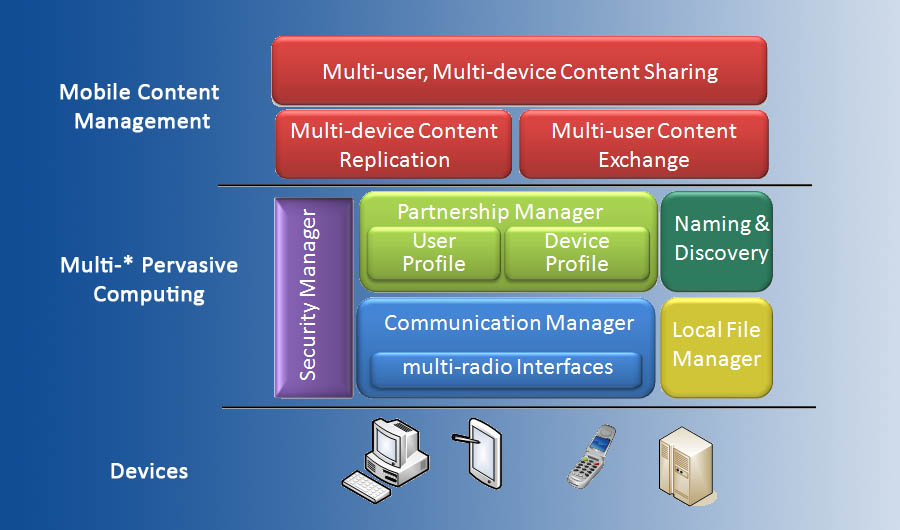Data Sharing and Replication in Pervasive Networks
Motivation
Nowadays, users rely on various sets of connected devices and services to interact with each other: home gateways, laptops, smartphones, UMPC, enterprise servers, Web/cloud computing services, etc. While for a long time, interactions have been mostly Web-centric, users now routinely engage in user centric interactions such as content sharing and social networking through mobile devices. Still, while mobile devices have become very capable of communicating with other devices, accessing or exchanging content is far from being easy: communication costs are still high, communication protocols are not uniformly supported, communication links are not always reliable, etc. Another problem lies in the role usually assigned to mobile devices.
Although mobile devices are the primary terminals for interaction, they have essentially focused on (i) acting as clients accessing services in the infrastructure (e.g., enablers in the IMS infrastructure for Telecoms networks, or Web services in the Internet), or (ii) manipulating content stored locally (e.g., multimedia content playback). So far, there has been little success in truly integrating these mobile devices in the pervasive computing environment (i.e., acting also as resource or service providers). Furthermore, the use of multiple devices, having large storage capabilities, has resulted in the scattering of content on a set of devices, which, ironically, is making access to all the content that one possesses a big challenge (Where is this file? Is it the latest version?). This problem becomes acute when it comes to impromptu collaboration (e.g., in business meetings, conferences, or on the road). Such collaborations often require exchange of content, and have to wait till the user gets physical access to the device over which the required content (or the correct/latest version) is currently stored. Delay in accessing the content often cause frustration and missed opportunities.
Research
To answer the above challenges, and better support interactions between mobile users, we are developing the iBICOOP middleware. Our middleware addresses these challenges by targeting both fixed and mobile devices, leveraging their characteristics (e.g., always on and unlimited storage for home/enterprise servers, ad hoc communication link between mobile devices), and by leveraging the capabilities of all available networks (e.g., ad hoc networks, Internet, Telecoms infrastructure networks). It also relies on Web and Telecoms standards to promote interoperability. The base architecture of the iBICOOP middleware consists of core modules on top of which we can develop applications that may arise in up-coming multi-device, multi-user world.
The base architecture of the iBICOOP middleware consists of core modules on top of which we can develop applications that may arise in up-coming multi-device, multi-user world.
- Communication Manager provides mechanisms to communicate over different available network interfaces: Bluetooth, WiFi, Cellular,
- Security Manager uses well-established techniques of cryptography to provide necessary security,
- Partnership Manager provides device or user information in the form of profiles,
- Naming & Discovery gives a human-readable name to a resource and relies on protocols to find nearby services on currently active network interfaces,
- Local File Manager gives user clear cues to the files that have been replicated across multiple devices or shared among different users.
- Multi-device Content Replication Service keeps track of the files that are replicated over the user workspace. A workspace is the total space available on all the user devices. A multi-criteria algorithm is used to choose the best way to transfer data during replication,
- Multi-user Device Exchange Service allows file transfer between specific devices belonging to particular users,
- Multi-user, Multi-device Sharing Service takes the abstraction to a higher level by allowing several users to interact and collaborate in various scenarios. No matter where data is located, users can transfer and share data between their workspaces. The aim of this service is to make long-term collaborations or impromptu exchanges an easier and secure task.
Contributors
- Pierre-Guillaume Raverdy
- Roberto Speicys Cardoso
- Valérie Issarny
- Nikolaos Georgantas
- Sneha Godbole
- Pushpendra Singh
- Amel Bennaceur
Supporting Grant
- Exoticus -- Pole de Competitivite SYSTEM@TIC - Etude et eXperimentation des outils & technologies IMS compatibles avec les usages
Technology Transfer
- AMBIENTIC: Ambient intelligence for nomadic communities
Presentations (registered users only)
Publications
- Titre
- The iBICOOP middleware: Enablers and Services for Emerging Pervasive Computing Environments
- Auteurs
- Bennaceur Amel; Pushpendra Singh; Raverdy Pierre-Guillaume; Issarny Valérie
- Détail
- In PerWare 2009 IEEE Middleware Support for Pervasive Computing Workshop (09/03/2009) 1-6
- Accès au texte intégral
-

